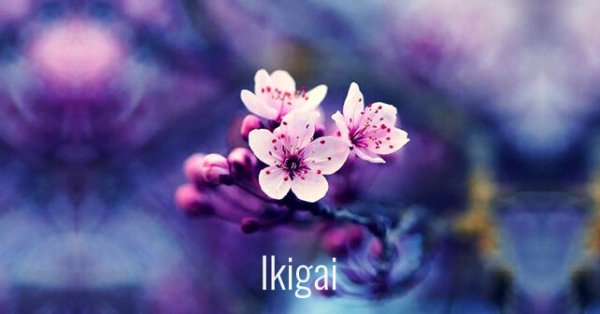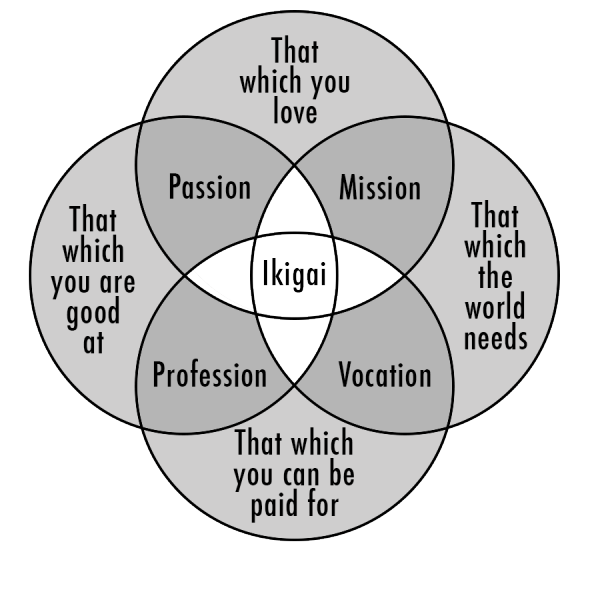Ikigai: An Art to Help You Find Your Life Purpose


Written and verified by the psychologist Valeria Sabater
Ikigai is a Japanese word that translates as “the reason for being” or “the reason we wake up every morning”.
For the Japanese, we all carry our own ikigai inside and it’s essential to discover it and own it. Because then will we have what it takes to overcome difficulty.
Few psychological and existential principles are as basic to our day-to-day life as the one this term encompasses.
Finding meaning in yourself, having reasons to live… it’s the key to keeping despair away. And it is basic in dealing with one of today’s worst evils: depression.
Many of our psychological problems could be improved by finding the ikigai that’s sometimes hidden, repressed and even silenced. It has the power to put air in our lungs and give us back our will to live.
It’s known, for example, that a good number of mood disorders see clear improvement when the person makes a commitment to themselves, doing simply what they like.
Soon, that set of positive thoughts and beliefs will act as buffers, protecting us from suicidal thoughts, limiting beliefs and fears.
However, we also know it’s not easy to commit ourselves to our ikigai, our life purpose.
Hence, the Japanese remind us that we must be like a loyal and energetic warrior who fulfills one very specific goal: to keep their integrity and love of life.

Your ikigai wants just one thing: to “shake off” your passivity
Sebastian Marshall is a famous writer who, a few years ago, gave us a book with a very simple title: Ikigai.
It must be said that in everything published on the topic, this book has had the most impact. It also stays away from some of those over-used words and concepts associated with personal growth.
Something that it explains to us is that our world is full of naysayers. Society invites us from day one to be happy. However, as we get older the only thing we find is one problem after another.
The first lesson we must learn is not to aspire to the same happiness that others “supposedly” have. Most of the time it is not real. If we obsess about having and doing the same as those around us, we will be like 99% of the population.
On the other hand, if we dare to act according to our dreams, desires and life purpose, we will be unique. We will be in the 1% that aspires to authentic fulfillment.
And it can only be achieved in one way: leaving our passivity behind and finding ikigai. Once we’ve clarified and defined it, several things will happen.
The first is that we will be more nonconformist, and that is good.
The second is that we will finally be aware of our own potential to turn it into “dynamite”.

How do I find my life purpose?
It may seem like a funny question to many of our readers. Who doesn’t know what their life purpose is? Well, curious as it may seem, it’s not always clear. In fact, sometimes we have goals, ideals and objectives that are somewhat distorted or impregnated by values that aren’t not ours.
Pressures from how we were raised, our family and social environment molds us in a way we aren’t always fully aware of.
Ikigai has always been there, although sometimes we stop committing to it. We choose to silence it and ignore it because we think nobody will understand us. We’re afraid we’ll be criticized or misunderstood.
We must stop postponing the needs, pleasures and passions that make us who we are and that in the end could determine our path. It’s not easy but we must do it.
We’ll now explain how to define your ikigai.

7 keys for shaping your ikigai
Your ikigai is shaped by the intersection of four basic aspects: your passion, your vocation, your profession and your mission in life. To clarify each of these key aspects, these strategies will help:
- Stop living on autopilot: ask yourself daily if what you do makes you happy.
- Don’t compare yourself to anyone. Don’t try to be the same as others. You are your own reference point.
- We all have talent. We all have some exceptional ability that sets us apart from others and we should take advantage of it. Make it yours and enjoy it.
- Ikigai is not only a life purpose or an aspiration, it’s a way of life that must be felt in the here-and-now.
- It’s something that gives us energy every morning and that translates into things we do every day and want to invest in to get better.
- Sometimes living according to our ikigai means leaving aside a large part of what surrounds us. We must be clear, therefore, that it will take courage.
- Ikigai is the opposite of passivity or conformism. It demands everything from you and makes you feel alive, free and full of energy, regardless of your age or your physical state because above all, it is a state of mind …
To conclude, if you haven’t yet found your ikigai, it’s ok. Sometimes in the journey of life the awakening happens so undeniably that there’s no turning back.
That’s the time when you’ll have no choice but to follow it.
Ikigai is a Japanese word that translates as “the reason for being” or “the reason we wake up every morning”.
For the Japanese, we all carry our own ikigai inside and it’s essential to discover it and own it. Because then will we have what it takes to overcome difficulty.
Few psychological and existential principles are as basic to our day-to-day life as the one this term encompasses.
Finding meaning in yourself, having reasons to live… it’s the key to keeping despair away. And it is basic in dealing with one of today’s worst evils: depression.
Many of our psychological problems could be improved by finding the ikigai that’s sometimes hidden, repressed and even silenced. It has the power to put air in our lungs and give us back our will to live.
It’s known, for example, that a good number of mood disorders see clear improvement when the person makes a commitment to themselves, doing simply what they like.
Soon, that set of positive thoughts and beliefs will act as buffers, protecting us from suicidal thoughts, limiting beliefs and fears.
However, we also know it’s not easy to commit ourselves to our ikigai, our life purpose.
Hence, the Japanese remind us that we must be like a loyal and energetic warrior who fulfills one very specific goal: to keep their integrity and love of life.

Your ikigai wants just one thing: to “shake off” your passivity
Sebastian Marshall is a famous writer who, a few years ago, gave us a book with a very simple title: Ikigai.
It must be said that in everything published on the topic, this book has had the most impact. It also stays away from some of those over-used words and concepts associated with personal growth.
Something that it explains to us is that our world is full of naysayers. Society invites us from day one to be happy. However, as we get older the only thing we find is one problem after another.
The first lesson we must learn is not to aspire to the same happiness that others “supposedly” have. Most of the time it is not real. If we obsess about having and doing the same as those around us, we will be like 99% of the population.
On the other hand, if we dare to act according to our dreams, desires and life purpose, we will be unique. We will be in the 1% that aspires to authentic fulfillment.
And it can only be achieved in one way: leaving our passivity behind and finding ikigai. Once we’ve clarified and defined it, several things will happen.
The first is that we will be more nonconformist, and that is good.
The second is that we will finally be aware of our own potential to turn it into “dynamite”.

How do I find my life purpose?
It may seem like a funny question to many of our readers. Who doesn’t know what their life purpose is? Well, curious as it may seem, it’s not always clear. In fact, sometimes we have goals, ideals and objectives that are somewhat distorted or impregnated by values that aren’t not ours.
Pressures from how we were raised, our family and social environment molds us in a way we aren’t always fully aware of.
Ikigai has always been there, although sometimes we stop committing to it. We choose to silence it and ignore it because we think nobody will understand us. We’re afraid we’ll be criticized or misunderstood.
We must stop postponing the needs, pleasures and passions that make us who we are and that in the end could determine our path. It’s not easy but we must do it.
We’ll now explain how to define your ikigai.

7 keys for shaping your ikigai
Your ikigai is shaped by the intersection of four basic aspects: your passion, your vocation, your profession and your mission in life. To clarify each of these key aspects, these strategies will help:
- Stop living on autopilot: ask yourself daily if what you do makes you happy.
- Don’t compare yourself to anyone. Don’t try to be the same as others. You are your own reference point.
- We all have talent. We all have some exceptional ability that sets us apart from others and we should take advantage of it. Make it yours and enjoy it.
- Ikigai is not only a life purpose or an aspiration, it’s a way of life that must be felt in the here-and-now.
- It’s something that gives us energy every morning and that translates into things we do every day and want to invest in to get better.
- Sometimes living according to our ikigai means leaving aside a large part of what surrounds us. We must be clear, therefore, that it will take courage.
- Ikigai is the opposite of passivity or conformism. It demands everything from you and makes you feel alive, free and full of energy, regardless of your age or your physical state because above all, it is a state of mind …
To conclude, if you haven’t yet found your ikigai, it’s ok. Sometimes in the journey of life the awakening happens so undeniably that there’s no turning back.
That’s the time when you’ll have no choice but to follow it.
This text is provided for informational purposes only and does not replace consultation with a professional. If in doubt, consult your specialist.







